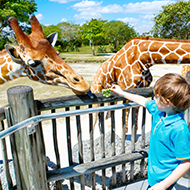Wild Welfare launches new system for reporting concerns

"We want to see a situation where animals in captivity have an overall net gain of positive welfare experiences" - Simon Marsh, Wild Welfare director.
Wild Welfare, a UK-based animal welfare charity, has released a new system for reporting concerns about captive wild animal facilities, such as zoos, aquariums or sanctuaries.
Members of the public will be able to submit a concern via a submission form on Wild Welfare's website, and the charity provides guidance on the 'concerns' page, to help people identify whether or not they should be concerned about an animal's welfare.
Simon Marsh, director of Wild Welfare, commented: “An animal’s welfare state can vary over time, its behaviour can alter depending on seasonal changes, age, health and or even time of the day.
“We want to see a situation where animals in captivity have an overall net gain of positive welfare experiences. That is why it is important for the public to ask questions if they have concerns.
“If they feel a facility is not providing appropriate animal welfare and have been unable to engage with the management of that facility about their concerns, then we would like to offer the opportunity to bring it to our attention.”
In a news release, the charity emphasised that the concerns process is not designed to condemn facilities, but to highlight potential opportunities for improvement.
“The new reporting system will streamline important data capture prospects to ensure that the charity can analyse where concern reports are originating from and whether action is possible,” Simon added.
“This data can give Wild Welfare a global picture of welfare concerns which can help to prioritise its work and develop strategies to ensure every captive wild animal is able to thrive and live a good life.”



 The Veterinary Medicines Directorate (VMD) is inviting applications from veterinary students to attend a one-week extramural studies (EMS) placement in July 2026.
The Veterinary Medicines Directorate (VMD) is inviting applications from veterinary students to attend a one-week extramural studies (EMS) placement in July 2026.